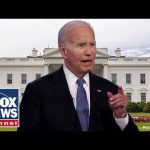As the conflict between Russia and Ukraine continues to unfold, a significant moment has emerged in the ongoing geopolitical landscape. Three years into the brutal invasion, President Trump is taking a strong stance against Vladimir Putin. The latest developments reveal that Putin launched Russia’s largest missile and drone assault yet, leaving behind a path of destruction that is hard to ignore. While many might feel that diplomacy in such dire situations is futile, Trump has a different perspective: real negotiations happen with adversaries, not allies.
Entering the fray is General Keith Kellogg, a special envoy for Ukraine, who is navigating the treacherous waters of diplomacy. His mission is to push back against Putin’s aggressive moves and pave the way for a potential cease-fire. The general explained that negotiating with Russia’s formidable leader is no simple task. It involves presenting a comprehensive plan that both sides can live with, and it requires immense patience and creativity. In his view, achieving peace might just depend on finding common ground where neither side feels entirely satisfied but can agree to a truce—the so-called “conference of fire.”
The stakes are high, and the consequences of ongoing bloodshed are severe. The general highlighted the staggering toll this war has taken on both Ukrainian and Russian forces, with casualties soaring into the millions. This alarming figure underscores the absolute necessity to curb violence and engage in meaningful dialogue. As it stands, Trump appears to be making moves that some would argue have seen more action in just a few months than President Biden has over a much longer period.
Putin’s reaction to the West’s involvement in Ukraine is another crucial piece of this puzzle. The Russian leader perceives support from nations like the United States and other NATO members as part of a proxy war against him. This mindset complicates the path forward, demonstrating that both sides must be prepared to make sacrifices if peace is ever to be achieved. The general emphasized that dialogue and compromise are essential tools in de-escalating tensions and moving towards a more stable future.
Amidst the chaos, there is hope. Recent exchanges between Ukrainian and Russian officials have led to the repatriation of prisoners, a small but meaningful sign of progress. For many families, this means reuniting with loved ones who have been away for far too long. It’s those gestures of humanity that remind everyone involved of what is at stake—lives, families, and futures.
President Trump remains committed to putting America first in this complicated equation while still recognizing the necessity of international engagement. His focus on the American people and their interests has shaped a unique approach to foreign policy. As the world watches this situation evolve, one message echoes loud and clear: the fight for peace often requires unwavering resolve and a willingness to listen. In these challenging times, both strength and diplomacy are needed to navigate the complex relationship between nations, especially as the shadow of war looms over Europe.




